- Home
- Marge Piercy
Fly Away Home Page 4
Fly Away Home Read online
Page 4
When at home for special occasions she would make the treats she prepared for the customers of Mario, Ross and the little girls would Ooh and Ah twice as much because they knew she was paid to do it for others. Ross was still working for the Johnson antipoverty program in Boston, in the housing office. His job had been exciting, in spite of the frustration, the graft, the level of corruption in the state and county and city government he simply could not believe. Patronage hacks with their hands in the till, the rake-offs, the kickbacks, the payoffs. He carried his anger home to her. That year he almost got an ulcer, yet he had been passionately engaged. Then he had been able to talk over his job with her the way he no longer could. Somehow the details of real estate trusts and drawing up deeds, all that legal paperwork did not provide him with material to share with her the way he had used to share his stories of skirmishes, advances and retreats in the war on poverty—and on the politicians.
He had used to come home boiling with words. Always they played with the children together. Always he helped put them to bed. He sang them songs for the bathtub, songs for the ride to bed, songs for putting on jammies, songs for tucking in. Abruptly her eyes filled with tears.
How silly she was being. Torte was sleeping in the sun where it hit the granite ledge. Reluctantly she turned from the garden to the house. The robins and blackbirds had gone south, to where her parents lived.
She sat down to run through the rest of her mail quickly. An invitation to attend the twenty-fifth wedding anniversary celebration for Chuck and Irma Petris. Clients of Ross’s? He received most of his mail at his office, but probably they had sent it home since they were inviting her also. Mr. and Mrs. Walker. Letter on General Foods stationery asking her to judge a baking contest. The last piece of mail for Ross was a rather good quality linen weave envelope addressed in a little crawling hand. She was curious about it as she carried it in with the American Express bill and his other mail to rest on the blotter of his walnut desk. His room on the northeast corner of the house with its forest green carpeting and beige draperies always felt somber. She usually scuttled in and out. Now she noticed his wastebasket still needed emptying. He had made a few sarcastic comments lately about her housekeeping, so she took it to tidy up. His room still smelled of something dead.
As she dumped it into a trash bag, she noticed a crumpled piece of notepaper on the same stationery as the envelope she had just carried in. From idle curiosity, she straightened it:
Dear Rusty,
You can expect our little visitor Tuesday night. I won’t disappoint you.
Yours,
Lou
She stood very still, one hand on the doorjamb. She must be crazy, she must be a raving paranoid, but a little visitor to her was a euphemism for a woman’s period. And what woman, Lou, would be writing to her husband about a period? She fished through the trash and found the envelope, identical to one that had come today, down to the Belmont postmark. Her brother Tony lived in Belmont, but she did not think this note had anything to do with him.
The phone rang and she leapt to pick it up as if it were the answer to what ran through her mind. It was the president of a Weston women’s club wanting her to give a little talk, a demonstration. While she negotiated date and price, she was still mulling over those few words: You can expect our little visitor. Won’t disappoint you. Twenty-two years she had lived with Ross and knew him if she knew anybody living. Her suspicions were absurd.
When she finally got off the phone, she raced downstairs and took the letter from his desk. Without giving herself time to think, she carried it into the kitchen and put a kettle on to boil. She had read about people steaming open envelopes in detective novels, but she had never tried it.
Steaming an envelope proved more difficult than she had anticipated. After the water finally boiled, it took her a full twenty minutes to pry the envelope unstuck, and then it was limp as cooked spinach. Quickly she unfolded the note.
Dear Rusty,
Too noisy this week. Visitor now set for Tuesday after next.
Yours,
Lou
Carefully she returned the note to its envelope. As she was trying to reseal it, the kittens chased each other across the kitchen floor. She jumped, dropping the packet. Finally she put it back on his desk, shut the door and crept out, limp as the envelope with shame. She felt as if someone had been running a Robot Coupe in her midriff. What did it all mean? The second note sounded far less as if a woman were worrying about being pregnant.
She checked the date on the envelope that had held the first letter. Not last Tuesday, then. The Tuesday previous, the night before she’d left for her trip. Where had Ross been? Actually right at home. He had insisted on entertaining that night, his two partners in his law office, Carl and Nancy Johansen and Roger and Barbara Kingsley. She had had two arguments with Ross about that dinner party. First, she had not wanted to have it at all the night before she set out on a ten-day promotional tour. It meant having to pack the morning before leaving, and not getting a full night’s sleep, as she had to set out for the airport at six-thirty. Ross had also insisted on including their neighbors Pierre and Annette in that dinner party, although she preferred to see them with real friends rather than with business associates. The evening had worked out awkwardly, with her talking to Pierre, Annette and Nancy, who seemed as out of the men’s brisk chitchat about real estate as Barbara was hot to engage in it. Usually Daria managed all right on these business evenings on a diet of bored wives, but Pierre and Annette clearly wondered why they had been invited.
There, that should fix her soap opera imagination. Tuesday had come and gone that week—or was that what was meant by noisy? But Ross had insisted on the dinner. He could have seen Lou, whoever Lou was, in perfect ease with her on the road. Had he? Was Ross the visitor? Was it a rendezvous? Who was Lou anyway? She swore she had never heard him mention a Lou.
Something was very wrong with her to allow her to entertain such a notion even briefly. She had always trusted Ross; she had picked him out for his rectitude. He was a good man and she was crazy. She made herself go down in the basement to iron. She loathed ironing shirts. Ross was right; she was becoming obsessed with sex. Next she would start questioning her daughters for prurient details. She was ashamed of her snooping, her fervid imaginings. Ironing his shirts was fitting penance.
Nevertheless she did not throw the old note back in the garbage but kept it in its envelope folded in a tight wedge in her pocket. When she went upstairs to her bedroom just before supper to change, she put it in her jewelry case, tucked under a loose flap of the velvet lining. Then she willed it out of her mind. If she did not brood about things, oftentimes they took care of themselves. She would forget and wait. All would be innocently explained, by and by.
3
Daria’s day ended up muddled and rushed. She had planned to work with Peggy until it was time to dress and meet Ross for a cocktail party some developer was giving. Although Ross had made a point of her not having to go, she wanted to please him even in the minor ways, to get back their fading intimacy. She planned to dress up far more than she usually bothered and meet him at the party in the new hotel complex just a few blocks from his office.
What altered her plan of the day was a phone call from Laura. Epicure had commissioned her to write a piece on Valentine sweets and she had done so last August. Now as they were putting their February issue together, some editor had decided they wanted a historical box to go with it, Valentine goodies past. Daria drove to the Boston Public Library to do some fast research. She parked under the Little Pru, taking the elevator up to Saks. Although Christmas decorations were going up all over the store, outside it was balmy, the air soft, scarcely a breeze and the sun rebounding off the pavements and the granite walls of the library.
Inside the library she kept her coat buttoned over the black cocktail dress. The BPL was a good library, but since funds for social services had been sharply curtailed, working there was like doing her res
earch on the back ward of a mental institution. The homeless dozed in chairs, spongebathed with wet paper towels in the bathrooms, eyed her purse longingly. Sometimes when both her hands were occupied, she had to clutch it between her knees. If she let go of it for a moment, one of the librarians would come over to issue a warning.
By five she had everything she needed. She had slipped off to a pay phone a couple of times to call Ross, but Lorraine had said each time he was with a client. She would simply go directly to his office and they’d head for the party together, an entrance she strongly preferred to wading into a bunch of strangers alone and having to search for him.
Walking briskly in the crowd of workers pouring out of the offices and shoppers heading home, she did not see the pickets until she was almost upon their skimpy ragged flock winding across the raised plaza on the east side of the Little Pru, formally named One Huntington Avenue. It was called the Little Pru by just about everybody because it was near to and smaller than the Prudential Building; she had always found it more attractive, warmer with its brick-faced pillars among the banks of glass. She first noticed the pickets’ wavering line with a prick of pity. It must be embarrassing to parade around in front of strangers with homemade hand-lettered signs. They seemed a mismatched bunch, an attractive dark-haired woman with a pretty little girl by the hand, both in new-looking coats in shades of maroon; a tall black man with a beige suede jacket zipped over hospital greens; a blowsy fat woman whose yellow hair looked incongruously freshly coiffed over a baggy green coat; a big broad-shouldered man who was twirling his sign high over everyone’s head and singing out something she could not catch, acting as if he were at a football game. But it was what his garish sign said that stopped her so that she rocked back on her heels. WALKER’S BUILDINGS ARE FIRETRAPS. LITTLE BOBBIE DIED SO CONDOS MAY LIVE.
Walker? That couldn’t have anything to do with her. Walker was a common name. She sidled closer through the hurrying crowd. People glanced at the pickets and glanced away, except for one man who was arguing with a curly-haired guy in a parka whose sign hung down but not enough to prevent her from reading WALKER AND PORFIRIO SLUM LANDLORDS.
Me? She felt as if someone had punched her. Of course not. Yet Walker and Porfirio must be her husband and one of her brothers. Tony and Ross did some kind of business together, although she realized she had no idea exactly what. She found her face heating and imagined herself blushing conspicuously, blinking red neon, in the plaza full of people rushing past, only herself and that man, who was arguing with the curly-headed guy holding the sign with her maiden name on it, standing still before the pickets. She felt dreadfully obvious, yet none of the picketers seemed to notice her stopped there ill at ease staring at them.
If she walked past them quickly, they would not look at her. Yet she did not feel safe till she had gained the lobby and slipped into an elevator everybody else was rushing from. Lorraine was halfway down the hall carrying a shopping bag as Daria stepped out of the elevator. “Has Ross left yet?”
“Not yet, Mrs. Walker. Are you going to that party after all? I thought …”
“Certainly I’m going. I know it means a lot to Ross.” She wanted to ask Lorraine about the pickets, but she was too embarrassed.
Ross was in his office on the phone when she knocked and then walked in. “Daria!” He jumped up, covering the receiver. “What are you doing here?”
She almost never bothered him at his office. “I had to do some work at the library, so I thought I’d go over with you.” She opened her coat to show him she was all dressed up.
“No,” he said to the phone. “I’ll talk to you later.… Not now.… By the way, my wife is coming over too.”
She posted herself at the window to kill time admiring his view, south across the city stretching away and east toward the bay. As she turned from the window she realized that the near wall was covered with extremely large photographs of the view from this window, in various stages of development. In the earlier photographs there were many streets of low redbrick buildings. High-rises bloomed in the later photographs, more in each. Some of the views must have been taken from someone else’s window, perhaps one of his law partners, pointing west, where the Christian Science mother church stood in lonely splendor, having removed a neighborhood to create a long colonnade with a reflecting pool and fountains.
Ross was off the phone. “You didn’t have to bother coming in for this silly party. It’s bound to bore you.”
“I don’t mind at all. We never have supper in the city together. I thought we might make a night of it.… Ross, who are those picketers out front?”
He stood, thrusting all the papers on his desk into a heap, his teeth tightly clamped in a grimace of anger. “Those miserable hoodlums! You saw them. They can’t annoy us in here, it’s trespassing, but they can try to embarrass me outside. But they’ll get bored parading back and forth. My best strategy at this point is simply to ignore them, and that’s what I intend to do. They’ll get damned tired and footsore.”
“But who are they? They have signs with our names on them.”
“They’re nobody. Nobody at all.” He sighed, walking from his desk to the windows and then turning toward the photographs. “They blew up nicely, didn’t they?”
“Are they yours, Ross?”
“Certainly are.” He beamed at the wall. “Look professional, don’t they?”
“Ross … is it some case you’re involved in? Those pickets?”
“That’s it. Some petty case. Forget about it. It’ll all blow over in a day or two.”
“I think there was something on the evening news, wasn’t there, about a child named Bobbie—Bobbie Rosario, wasn’t it?” Daria frowned, trying to recall a story she had noticed at the time only because of the death of a child. “Fire, wasn’t it? Are you defending his family? or are they suing somebody?”
“Just some paperwork. It’s a matter of a lot of hot air and little importance. We should head on over to the party.”
“But … won’t they try to stop us from leaving?”
“They won’t even see us. My car’s downstairs. If you really want to go to this party with me, we’ll take your car and I can pick up mine later on. I presume you parked downstairs too?” At her nod he grinned, clapping her on the shoulder. “I doubt if they have enough manpower, those poor creeps, to watch the exit from the garage. But if they do, they don’t know your Rabbit. They’re just a bunch of crackpots, Daria. All lawyers have to deal with fringe groups sometimes. Forget about them.”
He had not been pleased when she had walked into his office, probably because he disliked being barged in on. His work was a separate province than their life together, with sharply drawn and well-defended boundaries. But now she felt welcome. Her coming had been a good idea after all. Those pickets who had frightened and embarrassed her downstairs had unintentionally done her a service after all.
4
It was the Friday before Thanksgiving, a favorite holiday of Daria’s, but she had a knife-edge headache. She had had it since early afternoon. No amount of aspirin abraded its edge. Finally she abandoned her manuscript and went into the yard to rake oak leaves yesterday’s storm had torn loose.
The yard rose toward Annette’s in terraces until a granite ledge broke the surface splotched with lichens, the rock a note of the wild on the well-planted and well-tended hill. The maple in Daria’s yard had long since been stripped, but until this storm, nothing had torn the rags of leaves from Annette’s massive white oak.
“Getting chilly. Do you think we’ll have snow?” Annette called from her back door as she let her marmalade cat Fox inside. If Daria had not still worn her spiked helmet of headache, she would have crossed over to drink coffee. She could not talk; furthermore she felt bound to her house and yard. She was waiting for something—perhaps simply the pain to lift.
She had imagined she was waiting for the mail, until she met the mailman’s little truck. In fact one of those linen weave envelopes had been
among the day’s letters. No more of them had shown up in Ross’s wastebasket, but since she got the mail first every weekday, when a note appeared she read it, resealed it and put it with his other mail on his desk. This one read:
Dear Rusty
That was some party the other night, all right. Meet me with the usual at the usual. Now is that service?
Yours,
Lou
An earlier note had talked about a party postponed. She presumed he burned the notes. A large bronze ashtray on his desk sometimes held ashes, after having been clean for years. He never smoked. The notes remained mysterious, but she had mentioned them to no one. The last time Nina called, Daria had almost told her, but what was there to tell? Ross was a lawyer who carried out complicated business for many of his clients, she supposed. Sometimes she remembered those pickets, but as he had said, it seemed to have all blown over.
Crows were perched in the denuded maple on the downhill side. She found them oddly decorative, oversized and hulking, seven of them arranged in the branches in a rough arc like a candelabrum. The kittens were overawed and stayed close to her; they had become her cats. Every night she waited in hope that Ross would return to their room and her bed; every night when he had gone to sleep in Robin’s old room, she opened the door and let the kittens in.
When he got home that night she asked him, “Do you have everything you need for a photography session? We really should take care of those new publicity shots soon.”
“Tonight Chuck and Irma Petris are coming over.”
“I know, love. But soon. Please.”
About an hour after she had loaded supper dishes into the dishwasher and rejoined the dinner party sitting over liqueurs in the living room, she found out what she had been dreading. Dinner had not been a glorious success. The pumpkin soup had been a little peculiar, perhaps the yogurt added at the end too acid. The mustard lamb had been excellent, but the flageolets from her garden although carefully stored had been mushy.

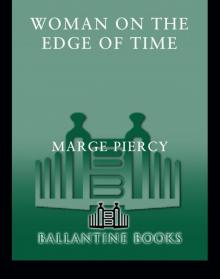 Woman on the Edge of Time
Woman on the Edge of Time The Cost of Lunch, Etc.: Short Stories
The Cost of Lunch, Etc.: Short Stories Made in Detroit: Poems
Made in Detroit: Poems Sleeping With Cats
Sleeping With Cats Moon Is Always Female
Moon Is Always Female The Longings of Women
The Longings of Women Circles on the Water
Circles on the Water Summer People
Summer People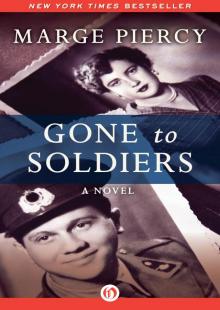 Gone to Soldiers: A Novel
Gone to Soldiers: A Novel The Hunger Moon: New and Selected Poems, 1980-2010
The Hunger Moon: New and Selected Poems, 1980-2010 Vida
Vida Fly Away Home
Fly Away Home He, She and It
He, She and It So You Want to Write
So You Want to Write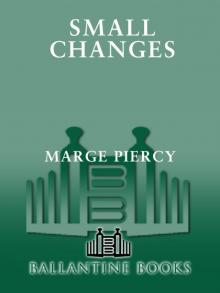 Small Changes
Small Changes Braided Lives
Braided Lives Lord Valentine's Castle
Lord Valentine's Castle Dance the Eagle to Sleep
Dance the Eagle to Sleep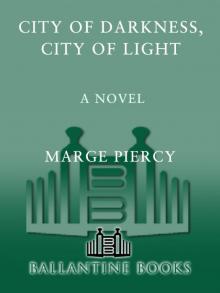 City of Darkness, City of Light
City of Darkness, City of Light The High Cost of Living: A Novel
The High Cost of Living: A Novel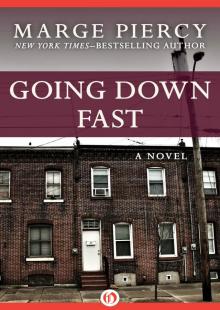 Going Down Fast: A Novel
Going Down Fast: A Novel My Mother's Body
My Mother's Body Storm Tide
Storm Tide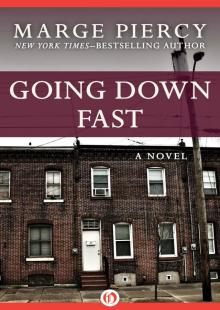 Going Down Fast
Going Down Fast The Third Child
The Third Child The Hunger Moon
The Hunger Moon The Cost of Lunch, Etc.
The Cost of Lunch, Etc. Sex Wars
Sex Wars The High Cost of Living
The High Cost of Living Made in Detroit
Made in Detroit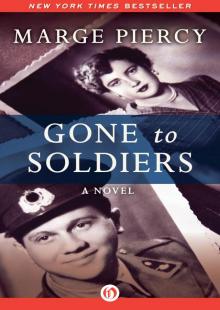 Gone to Soldiers
Gone to Soldiers